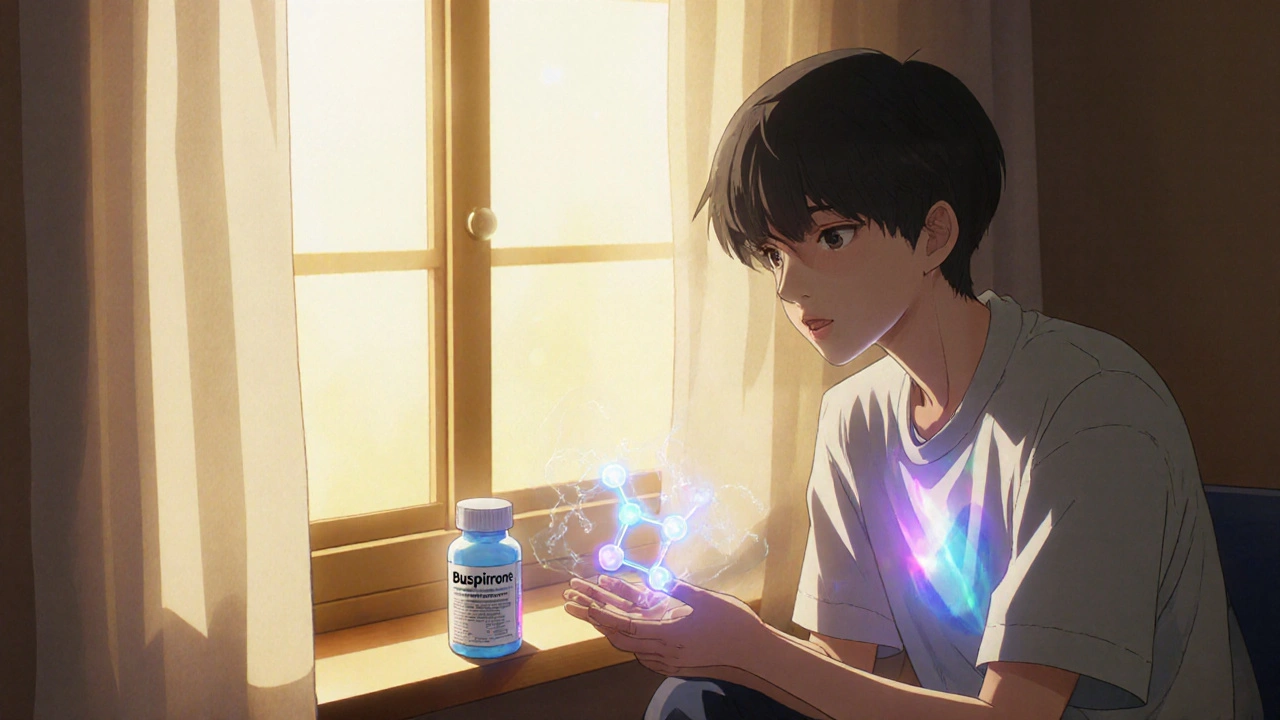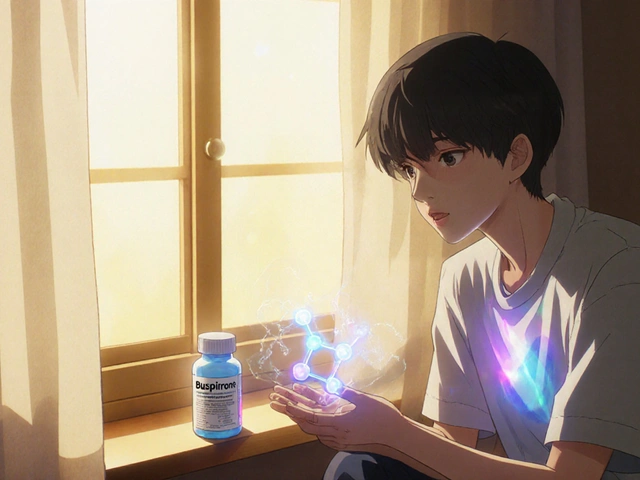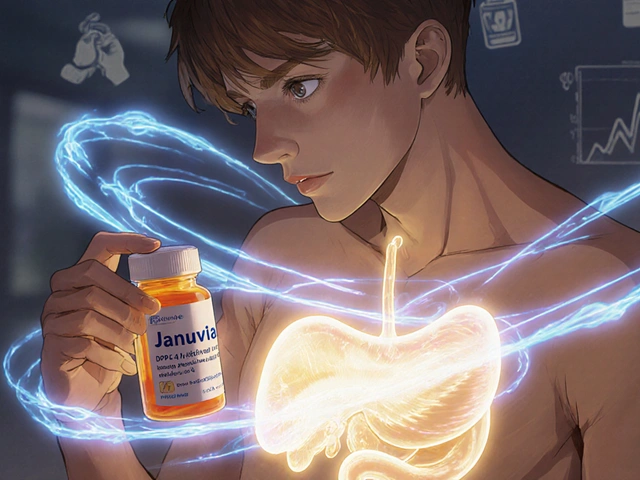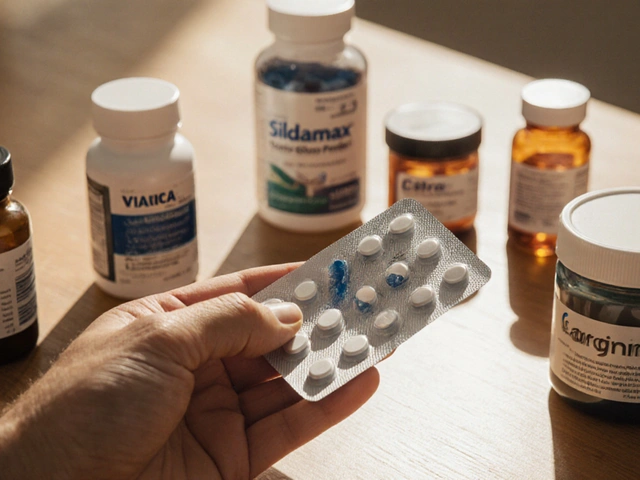Buspirone Augmentation Calculator
Patient Assessment
Answer these questions to determine if buspirone may be a suitable augmentation option for your SSRI treatment.
Your Results
Buspirone vs. Other Options
Recommendation
When SSRIs don’t fully work for depression, doctors often turn to augmentation - adding another medication to boost the effect. One of the most underappreciated but effective options is buspirone. Originally approved for anxiety, buspirone is now widely used off-label to enhance antidepressant response, especially in patients who still feel stuck despite taking an SSRI. It’s not a magic bullet, but for many, it’s the missing piece.
How Buspirone Works Differently from SSRIs
SSRIs like sertraline, fluoxetine, or escitalopram work by blocking the reabsorption of serotonin in the brain, leaving more of it available to improve mood. Buspirone doesn’t do that. Instead, it directly stimulates serotonin 5-HT1A receptors, acting as a partial agonist. This means it doesn’t flood the system with serotonin - it fine-tunes how the brain responds to it. This difference matters because it avoids many of the side effects tied to high serotonin levels. While SSRIs can cause emotional numbness, sexual dysfunction, and weight gain, buspirone doesn’t. In fact, it may help fix those problems. Studies show that adding buspirone to an SSRI can reverse sexual side effects in over 60% of cases, including delayed ejaculation and low libido. That’s not a small win - for many patients, sexual health is a major reason they stop taking antidepressants.Efficacy: Does It Actually Help Depression?
The evidence is strong, especially for people with severe or treatment-resistant depression. In the landmark STAR*D trial and follow-up studies, adding buspirone to an SSRI led to significantly better outcomes than placebo. One 2023 double-blind trial with 102 patients showed noticeable improvement in depression scores within the first week - something you rarely see with other augmenting agents. The biggest gains were in patients with baseline MADRS scores above 30, meaning their depression was moderate to severe. For these individuals, buspirone augmentation improved response rates from 41.7% (placebo) to 62.3%. That’s a 20-point jump - clinically meaningful and consistent across multiple studies. It’s not just about mood. Patients also report reduced anxiety, better sleep, and less emotional blunting. A 2024 trial (BUS-EMO) found that buspirone improved emotional responsiveness by 37% compared to placebo, suggesting it may help patients feel more alive again - not just less sad.Side Effects: What to Expect
Buspirone is generally well-tolerated. The most common side effects are mild and tend to fade after the first week:- Dizziness (14.3% of users)
- Headache (11.1%)
- Nausea (9.6%)
- Nervousness or restlessness (9.1%)
How It Compares to Other Augmentation Options
Doctors have several tools to boost SSRIs: lithium, thyroid hormone, antipsychotics like aripiprazole, or even stimulants like modafinil. Here’s how buspirone stacks up:| Agent | Effect Size | Weight Gain | Metabolic Risk | Monitoring Required | Sexual Side Effects |
|---|---|---|---|---|---|
| Buspirone | 0.25-0.30 | Minimal (0.3 kg avg) | None | No | Reduces |
| Aripiprazole (Abilify) | 0.27 | 2.5-4.2 kg | High (triglycerides, glucose) | No | Worsens |
| Quetiapine XR | 0.32 | 3.0-5.0 kg | High | No | Worsens |
| Lithium | 0.28 | Mild | Low | Yes (blood levels) | May worsen |
| Thyroid Hormone | 0.20 | None | Low | Yes (TSH) | Variable |
Dosing and How to Start
There’s no one-size-fits-all dose, but most clinicians start low:- Begin with 5 mg twice daily (morning and evening)
- Increase by 5 mg every 3-5 days as tolerated
- Target dose: 20-30 mg daily (split into two doses)
- For severe cases, some go up to 45-60 mg daily under close supervision
Drug Interactions to Watch For
Buspirone is broken down by the liver enzyme CYP3A4. Anything that blocks this enzyme can cause buspirone to build up in your system - leading to more side effects. Avoid or use caution with:- Grapefruit juice (can increase buspirone levels by 4x)
- Antifungals like ketoconazole or itraconazole
- Antibiotics like erythromycin or clarithromycin
- Some HIV medications and certain heart drugs
Who Benefits Most?
Not everyone responds the same. Buspirone augmentation shines in specific groups:- Patients with severe depression (MADRS >30)
- Those experiencing SSRI-induced sexual dysfunction
- People who can’t tolerate weight gain or metabolic changes
- Elderly patients (no anticholinergic effects, safe with warfarin)
- Those who want to avoid antipsychotics
Cost and Accessibility
Buspirone is one of the cheapest augmentation options available. Generic buspirone 10 mg tablets cost about $4.27 for 60 tablets (GoodRx, October 2023). That’s less than $0.08 per dose. Compare that to aripiprazole (Abilify), which can cost over $780 for a 30-day supply. Even with insurance, the out-of-pocket difference can be hundreds of dollars a month. For patients on fixed incomes or without good coverage, buspirone is often the only practical choice. In 2023, over 1.2 million U.S. outpatient visits included buspirone prescribed for depression augmentation - a 17% increase from the year before. More doctors are recognizing its value.What’s Next for Buspirone?
Research is expanding. Beyond depression and sexual dysfunction, trials are looking at whether buspirone can reverse emotional blunting - that flat, numb feeling many patients get on SSRIs. Early results are promising. Also, as concerns grow about the long-term metabolic effects of antipsychotic augmentation, buspirone’s clean profile makes it a natural fit for an aging population. Experts predict its use will keep rising, especially in older adults and those with chronic depression.Final Thoughts
If you’ve been on an SSRI for months and still feel stuck - not just sad, but disconnected, numb, or sexually impaired - buspirone might be worth discussing with your doctor. It’s not a miracle drug, but it’s one of the safest, most effective, and affordable ways to improve outcomes without adding new problems. It doesn’t fix everything. But for many, it’s the quiet upgrade their treatment needed all along.Can buspirone help with SSRI-induced sexual dysfunction?
Yes. Studies show buspirone improves SSRI-related sexual side effects in about 60-63% of cases. It’s particularly effective for delayed ejaculation and low libido. The mechanism likely involves its metabolite 1-PP, which blocks alpha-2 receptors involved in sexual response. In clinical cases, patients reported returning to normal sexual function within 1-2 weeks of starting buspirone, without losing antidepressant benefits.
How long does it take for buspirone to work when added to an SSRI?
For anxiety, buspirone typically takes 2-4 weeks. But when used to augment depression, some patients see mood improvements within the first week. A 2023 trial showed statistically significant drops in depression scores by week one. Full benefits usually appear by 6-8 weeks. Patience is key - but don’t wait too long if you’re not seeing any change at all.
Is buspirone addictive?
No. Unlike benzodiazepines, buspirone doesn’t act on GABA receptors and has no potential for dependence or withdrawal. It doesn’t cause tolerance either. You can start and stop it without tapering in most cases, though your doctor may recommend a gradual reduction to avoid mild rebound anxiety or dizziness.
Can I take buspirone with alcohol?
It’s not recommended. While buspirone doesn’t interact dangerously with alcohol like benzodiazepines do, combining them can increase dizziness, drowsiness, and impair coordination. For safety, avoid alcohol - especially when you’re just starting buspirone or adjusting your dose.
Does buspirone cause weight gain?
No. Unlike many other antidepressant augmenting agents, buspirone causes minimal to no weight gain. Clinical trials show an average weight change of just 0.3 kg (less than a pound) over several months. This makes it a preferred choice for patients concerned about metabolic side effects.
Is buspirone FDA-approved for depression?
No. Buspirone is FDA-approved only for generalized anxiety disorder. Its use for depression is off-label. But off-label use is common and legal in psychiatry - especially when backed by strong evidence. The American Psychiatric Association lists buspirone as a second-line augmentation option with moderate evidence for treatment-resistant depression.
What if buspirone doesn’t work for me?
If you’ve tried buspirone at an adequate dose (at least 30 mg daily) for 8 weeks with no improvement, it’s unlikely to help. Your doctor may consider other options like lithium, thyroid hormone, or in some cases, a low-dose antipsychotic. But if you had side effects or couldn’t tolerate it, alternatives like modafinil or vortioxetine may be better suited.








Write a comment
Your email address will be restricted to us